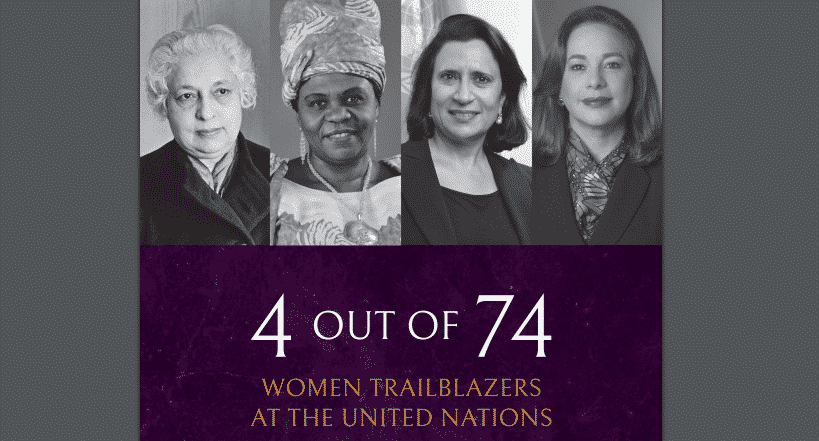NEW YORK, SEPTEMBER 1 – In the 76-years history of the United Nations, only four women – less than one percent of the total – have been elected as Presidents of the General Assembly. “The answer to the question ‘why only four?’ in the entire life of the organization is not simple”, the Italian Permanent Representative to the UN Maurizio Massari said, quoting from the preface to a new book – “4 out of 74 – Women Trailblazers at the United Nations” – launched today at the United Nations during a virtual event co-organized by the Mission of Italy and UN Women.
 India’s Vijaya Lakshmi Pandit in 1953; Liberia’s Angie Elizabeth Brooks in 1969; Sheikha Haya Rashed Al Khalifa from Bahrain in 2006; and Ecuador’s María Fernanda Espinosa Garcés in 2018. The book, completed two years ago – and that’s why 74 instead of 76 – “simultaneously captures both the successes of four incredible women and the dramatic gap in women’s representation at the highest levels of the United Nations,” said the outgoing President of the Assembly, Volkan Bozkir, speaking at the presentation of the volume. Italy, which sponsored the publication through a dedicated funding together with Qatar, has also contributed to its editing with a preface written by the former Permanent Representative Mariangela Zappia, today the first woman serving as Italian ambassador to the United States and, before that, the first Italian woman at the head of the Italian Mission to the UN: “Being one of those women who ‘made it’ to the top, I strongly believe that I also have a personal duty to serve as an example to younger generations”, wrote Zappia.
India’s Vijaya Lakshmi Pandit in 1953; Liberia’s Angie Elizabeth Brooks in 1969; Sheikha Haya Rashed Al Khalifa from Bahrain in 2006; and Ecuador’s María Fernanda Espinosa Garcés in 2018. The book, completed two years ago – and that’s why 74 instead of 76 – “simultaneously captures both the successes of four incredible women and the dramatic gap in women’s representation at the highest levels of the United Nations,” said the outgoing President of the Assembly, Volkan Bozkir, speaking at the presentation of the volume. Italy, which sponsored the publication through a dedicated funding together with Qatar, has also contributed to its editing with a preface written by the former Permanent Representative Mariangela Zappia, today the first woman serving as Italian ambassador to the United States and, before that, the first Italian woman at the head of the Italian Mission to the UN: “Being one of those women who ‘made it’ to the top, I strongly believe that I also have a personal duty to serve as an example to younger generations”, wrote Zappia.
Women’s empowerment activists, business leaders, civil society and youth organizations took part in the meeting, moderated by UN Women’s Deputy Director Anita Bhatia. While it’s hard to answer the question of why only four women have been elected to the top of the General Assembly in the organization’s lifetime, “there is one thing we can more easily do: start to speak up loud in favor of gender equality and adopt concrete measures for its implementation in all areas,” Massari said, noting that in 2020, because of COVID, progress for women’s rights was put on hold and in some cases even dramatically reversed.
Extensive data published earlier this year by U.N. agencies showed how women are “the first victims of the pandemic,” Massari said, citing, among other things, the worldwide spike in domestic violence. More generally, women are victims of structural vulnerabilities, for example due to climate change. For these reasons, Italy has put the issue of gender equality at the top of its national and multilateral agenda, as stressed by Prime Minister Mario Draghi in his inaugural speech at Palazzo Chigi and then during Italy’s G20 presidency. “In June, the G20 adopted a ‘road map’ to reach and go beyond the goal of reducing the gender gap by 25% by 2025,” Massari recalled. “This road map includes 17 indicators to monitor progress”.
Italy is committed to explore every possible synergy at G20, UN and EU level, the Ambassador added, citing, among the various initiatives promoted by the Italian government, its commitment against harmful practices such as female genital mutilation, early and forced marriages and gender-based violence, and on the other hand, at the regional level, through the promotion of the Mediterranean Women Mediators Network to increase the number of women in the field of international peace and security.
Massari dedicated a passage of his introductory speech to the dramatic situation of women in Afghanistan, at the center of an appeal of the very first Conference ever organized within the G20 on women empowerment: “As stressed by Prime Minister Draghi, women and girls are on the verge of losing freedom and dignity, returning to the terrible state of two decades ago. The G20 must do all it can to ensure that Afghan women retain their freedoms and fundamental rights, starting with education.” (@OnuItalia)

